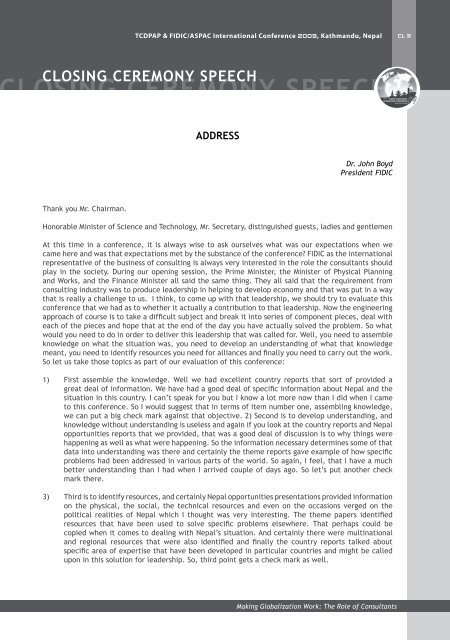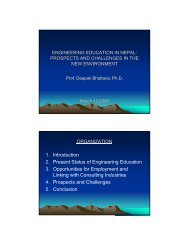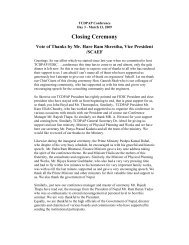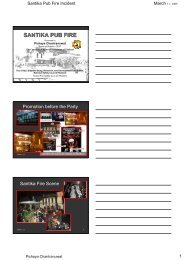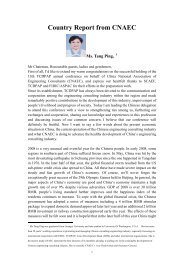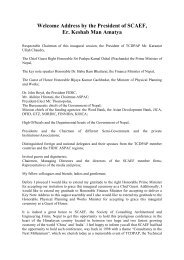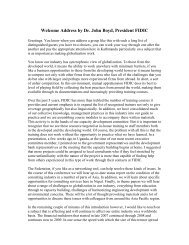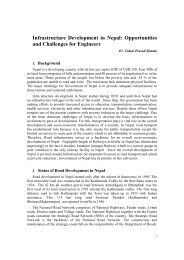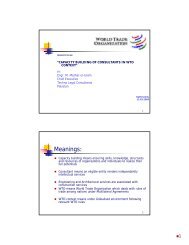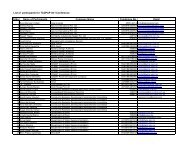Supplementary Proceeding SCAEF conference.pdf - Society Of ...
Supplementary Proceeding SCAEF conference.pdf - Society Of ...
Supplementary Proceeding SCAEF conference.pdf - Society Of ...
Create successful ePaper yourself
Turn your PDF publications into a flip-book with our unique Google optimized e-Paper software.
TCDPAP & FIDIC/ASPAC International Conference 2009, Kathmandu, Nepal<br />
CL 3<br />
CLOSING CEREMONY SPEECH<br />
address<br />
Dr. John Boyd<br />
President FIDIC<br />
Thank you Mr. Chairman.<br />
Honorable Minister of Science and Technology, Mr. Secretary, distinguished guests, ladies and gentlemen<br />
At this time in a <strong>conference</strong>, it is always wise to ask ourselves what was our expectations when we<br />
came here and was that expectations met by the substance of the <strong>conference</strong>? FIDIC as the international<br />
representative of the business of consulting is always very interested in the role the consultants should<br />
play in the society. During our opening session, the Prime Minister, the Minister of Physical Planning<br />
and Works, and the Finance Minister all said the same thing. They all said that the requirement from<br />
consulting industry was to produce leadership in helping to develop economy and that was put in a way<br />
that is really a challenge to us. I think, to come up with that leadership, we should try to evaluate this<br />
<strong>conference</strong> that we had as to whether it actually a contribution to that leadership. Now the engineering<br />
approach of course is to take a difficult subject and break it into series of component pieces, deal with<br />
each of the pieces and hope that at the end of the day you have actually solved the problem. So what<br />
would you need to do in order to deliver this leadership that was called for. Well, you need to assemble<br />
knowledge on what the situation was, you need to develop an understanding of what that knowledge<br />
meant, you need to identify resources you need for alliances and finally you need to carry out the work.<br />
So let us take those topics as part of our evaluation of this <strong>conference</strong>:<br />
1) First assemble the knowledge. Well we had excellent country reports that sort of provided a<br />
great deal of information. We have had a good deal of specific information about Nepal and the<br />
situation in this country. I can’t speak for you but I know a lot more now than I did when I came<br />
to this <strong>conference</strong>. So I would suggest that in terms of item number one, assembling knowledge,<br />
we can put a big check mark against that objective. 2) Second is to develop understanding, and<br />
knowledge without understanding is useless and again if you look at the country reports and Nepal<br />
opportunities reports that we provided, that was a good deal of discussion is to why things were<br />
happening as well as what were happening. So the information necessary determines some of that<br />
data into understanding was there and certainly the theme reports gave example of how specific<br />
problems had been addressed in various parts of the world. So again, I feel, that I have a much<br />
better understanding than I had when I arrived couple of days ago. So let’s put another check<br />
mark there.<br />
3) Third is to identify resources, and certainly Nepal opportunities presentations provided information<br />
on the physical, the social, the technical resources and even on the occasions verged on the<br />
political realities of Nepal which I thought was very interesting. The theme papers identified<br />
resources that have been used to solve specific problems elsewhere. That perhaps could be<br />
copied when it comes to dealing with Nepal’s situation. And certainly there were multinational<br />
and regional resources that were also identified and finally the country reports talked about<br />
specific area of expertise that have been developed in particular countries and might be called<br />
upon in this solution for leadership. So, third point gets a check mark as well.<br />
Making Globalization Work: The Role of Consultants


